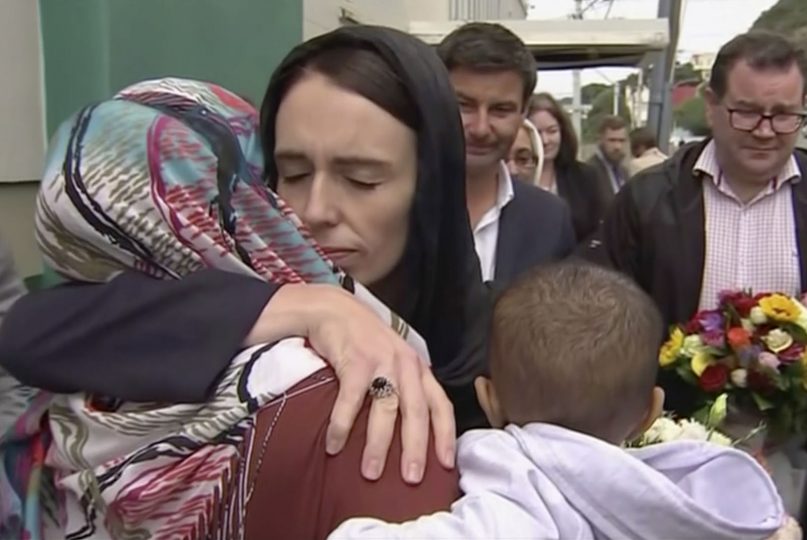(RNS) — I’m just an ordinary white man, 29 years old.
Born in Australia to a working class, low-income family. My parents are of Scottish, Irish and English stock.
I had a regular childhood, without any great issues.
These words are taken directly from the manifesto of the terrorist who killed 50 people in Christchurch, New Zealand, last week. I changed the age to my own because that is the only thing that differentiates us in these opening 36 words.
Beyond that, however, our directions in life could not be more different. The Christchurch shooter and I may have grown up in parallel, but our lives deviated because of the choices we made. Choices like those are what separates someone like him from someone like me.
RELATED: New Zealand shooting hits home for American Muslims
Even as we started school, we seemed similar. Like him, I was teased for being chubby. I, too, had little interest in education. I also played video games, and often they were violent. But I didn’t end up radicalized by white supremacy. I didn’t choose to shoot more than 100 people because of their faith.
Instead, I chose to go to university in Dunedin, New Zealand, where the shooter had originally planned his attack. I studied law, graduated, and moved to the U.S. Now, with Donald Trump — whom the killer refers to as a “symbol of renewed white identity” — president of the country I now call home, I serve as executive director of a nonprofit called Jetpac, where I train American Muslims to run for office. Jetpac is dedicated to increasing civic engagement for marginalized communities.
Unfortunately, it’s all too easy for me to see how someone like him happens. As I began my high school years, I was racist. It pains me to admit it, but I must hold myself accountable. Like all perspectives infected with bigotry, mine defied logic. My mother received an unemployment benefit, yet I derided my Māori peers at school who were in the same situation.
Thankfully, I broke free. I decided that the fact that I lived in New Zealand was more important than where I was born or where my great grandparents were from. I chose to embrace Māori culture and went on to pursue a career as a public interest advocate. I now recognize and actively work against the systemic nature of white supremacy.
It should be on everyone — especially those most privileged by it — to take a stand against white supremacy. But those with the biggest platforms must lead by example. As individuals, we can make a difference by holding them accountable. Donald Trump used the language of “invading immigrants” just hours after the Christchurch shooting. He has refused to admit that white supremacy is on the rise, despite data empirically proving otherwise. He is just an example of America’s shifting perspective of normalcy. This is unacceptable.
But the Christchurch tragedy has shown us that hate has no borders, the onus isn’t just on America — Australian and New Zealand politicians are following this same global trend of bigotry.
Fraser Anning, a senator from Queensland, Australia, responded to the mosque attacks by blaming immigrants for creating the environment in which this attack could happen. In August, he called for a “final solution” to “non-European immigration” to Australia. He is not alone in expressing such sentiments in the Australian parliament, where the influence of white supremacy has been growing for decades. This, too, is unacceptable.
Winston Peters, deputy prime minister of New Zealand and leader of the New Zealand First Party, has previously equated Muslims with extremism, and in 2005 he said that Islam is “like the mythical Hydra — a serpent underbelly with multiple heads capable of striking at any time and in any direction.” He is just one instance of rising Islamophobia in New Zealand. This is unacceptable.
These elected officials have a unique opportunity, platform and responsibility to bring people together across the boundaries of race, religion and culture. Unlike New Zealand Prime Minister Ardern, they have abdicated that responsibility and given their platform to white supremacy.
And now, they have a choice to make. Our lives and our impact in this world are marked by a series of decisions. I may have grown up in parallel with the Christchurch shooter, but our lives diverged because of explicit choices we each made. He and I are now worlds apart.
The opportunity for the Trumps, Annings, and Peters of the world is to absolve themselves: to explicitly denounce the ideology they’ve espoused and to bring their communities together, embracing unity as they uphold our core values.
If they do not, they give license to the most racist and unhinged elements of society and implicitly tell them their hatred is acceptable. And we will hold them accountable.
(Shaun Kennedy co-founded Jetpac, a 501(c)(3) nonprofit that trains American Muslim leaders as civic organizers. He has a law degree from the University of Otago, New Zealand, and has been working as a political consultant in Boston since early 2015. The views expressed in this commentary do not necessarily represent those of Religion News Service.)





